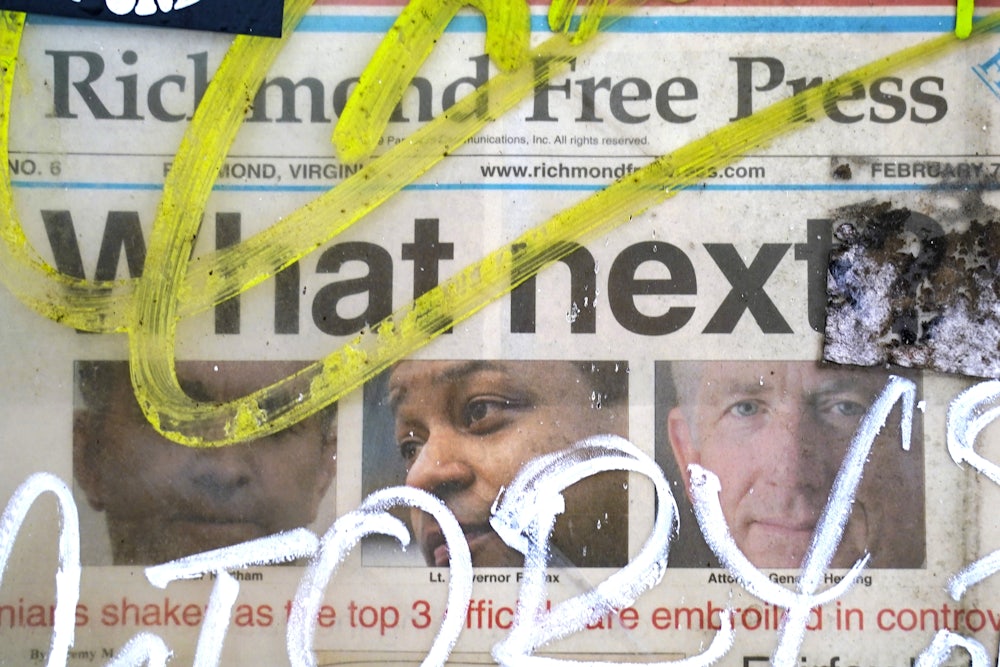For most Americans, the 2019 political calendar has been overshadowed by next year’s presidential battle royale, which will feature an embattled incumbent, possible impeachment proceedings in Congress, and a Democratic primary race dominated by sweeping proposals like Medicare for All and the Green New Deal. In Virginia, however, another political battle has been raging, as Democrats and Republicans fight for control of the closely divided state General Assembly and the ability to carve up the state’s legislative and congressional districts for the next decade. The outcome in November could have long-lasting, even permanent, repercussions for the state, as well as for the national electoral map. “We are one vote, one election, and one bill away from being New York and California,” state Senate candidate Todd Pillion, a Republican, warned his conservative constituents in May.
The result of Virginia’s off-off-year election will be determined both by national trends and a host of issues unique to the state, starting with its own embattled incumbent governor, Ralph Northam, a Democrat whose credibility plummeted when he made national news in February for admitting to wearing blackface while in college. The grainy evidence—a yearbook image featuring one guy whose face is coated in dark makeup and another in a Ku Klux Klan robe, though it is unclear which, if either, is Northam—has already been used against Democrats running in state races.
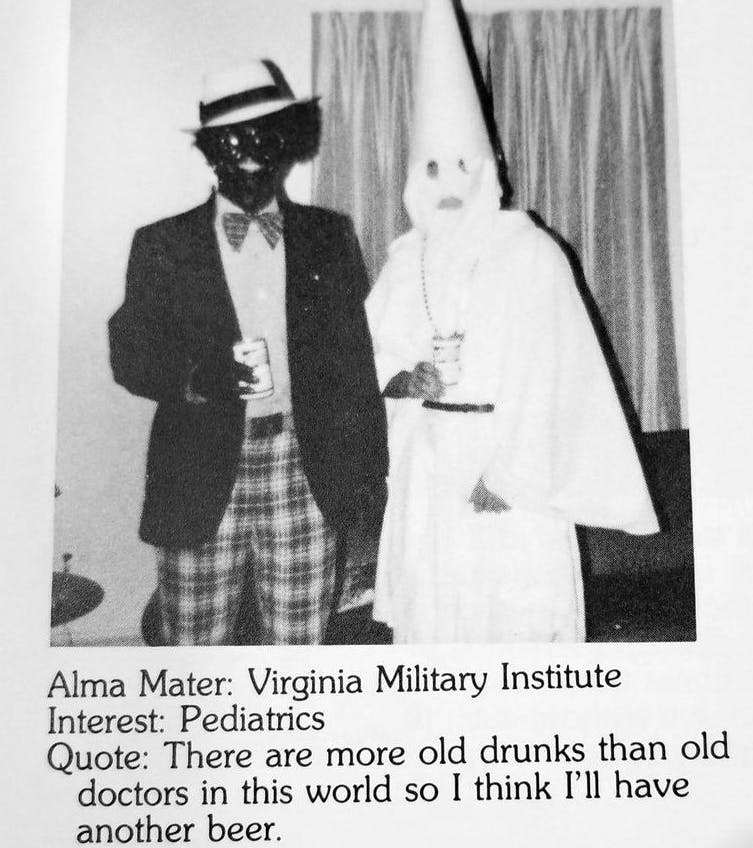
Targets on the Democratic slate include Ghazala Hashmi, a college professor raised in Georgia who, if elected in suburban Richmond’s 10th Senate district, would become the state Senate’s first Muslim-American woman. A doctored propaganda piece showing Hashmi and Northam holding a framed poster-size version of the yearbook image has been disseminated by her opponent, state Senator Glen Sturtevant. Sturtevant, who did not respond to requests for an interview, is just one of numerous Republicans who will be banging on Northam on the campaign trail. “Trust me, he won’t be the only one,” said Jeff Ryer, press secretary for Republicans in the state Senate. “It’s definitely going to be coming up.”
But Hashmi, like other Democrats across the state, believes she has a trump card, so to speak, in an election season that is also being driven by voters’ frustration with national politicians—especially the president. “Voters are really distressed at the level that we are at with our national discourse,” Hashmi told me. “They want leadership, they want a new direction, and they want a focus that is committed to taking care of communities. They realize that the way that they can effect change is to actually focus on local and state races.”
Thanks to the White House, Virginia is swimming in Democratic donor cash and anti-Trump fervor. Trump’s election energized Virginia Democrats to flip 15 state House seats in 2017 and three in the U.S. House of Representatives in 2018. Democrats are anxious to continue taking advantage, making an all-out push to win majorities in both chambers of Virginia’s legislature ahead of redistricting that will occur after the 2020 Census. Their candidates are riding a whirlwind of outrage over the ongoing disaster of Donald Trump’s presidency, while Republicans are hunkering down in the hopes of eking out a narrow victory. “There are a lot of angry Democrats, and it’s easier to get them to the polls,” Ryer said.
This dynamic isn’t so different from what’s happening in other states that have changed demographically in recent decades, as liberal voters migrate to metropolitan regions and leave Republican voters clustered in higher concentrations, but smaller populations, in rural areas. What’s happening in Virginia could well serve as a taste of things to come on the national political scene in 2020, when a poisonous president will be at the top of the Republican ticket. “The Virginia electorate is a microcosm of the country,” said Jesse Ferguson, a Democrat strategist. “In Virginia, you have suburban and exurban voters, rural voters, African American and Latinx populations, veteran’s communities, all wrapped together in one state. Virginia is the best early warning system for the mood of the country.”
If Virginia is anything to go by, the mood is bleak—for Republicans, anyway.
When people speak of anger or outrage in politics, it suggests a kind of radiant, all-devouring fury that consumes everything in its path. But a closer look at the issues driving Virginia’s election shows that voter anger can be narrowly targeted, its character changing race by race. Indeed, the one issue perhaps most associated with Democratic anger at the president—impeachment—has been largely absent from Democratic campaigns so far.
“You can look at an issue like gun violence prevention,” said Susan Swecker, who chairs the Democratic Party of Virginia, “and see where the extreme position of the Republican Party has put them out of touch and out of step with the very suburban voters they need to win if they want to become a majority party in the commonwealth of Virginia again.”
In Appalachian Virginia’s New River Valley, Delegate Chris Hurst, one of 15 freshmen Democrats elected in a 2017 wave that brought them within a single vote of parity with Republicans in the House of Delegates, stands as the westernmost Democrat in the state. A former news anchor at WDBJ7 in Roanoke, Hurst entered the 2017 campaign six months after his girlfriend, a reporter at the station, and her cameraman were shot dead during a live interview by a former reporter.
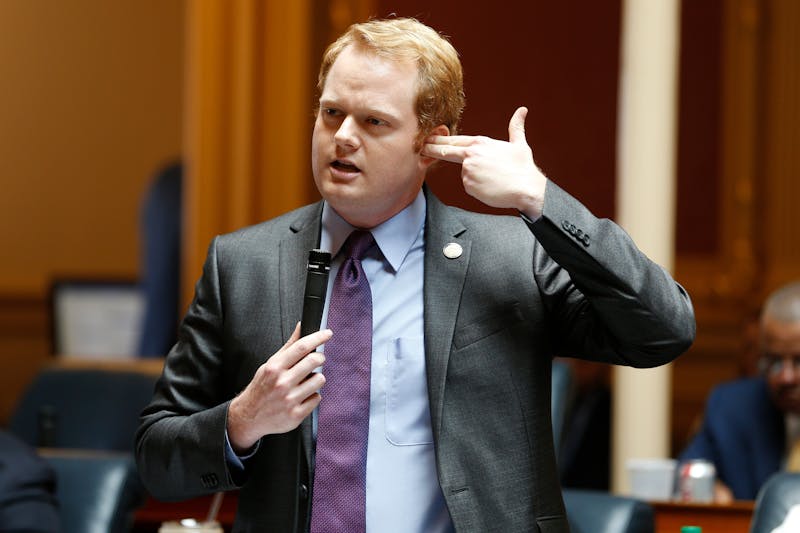
Hurst has emerged as a party leader and one of the stars of the 2017 class, and his fundraising prowess and name recognition have prevented his opponent, Forrest Hite, from gaining much of a foothold in a district that’s split between rural mountains and the university town of Blacksburg, home to Virginia Tech. Hurst condemned Republicans after they adjourned a special session on gun violence without considering a single bill following the May shooting rampage in Virginia Beach that killed 12 people and wounded four. “Sticking your fingers in your ears looks exactly the same as a gun pointed at somebody’s head,” Hurst said on the House floor. Back in his largely rural district, however, Hurst talks more about education, which he named as voters’ top issue.
Suburban Richmond is home to another marquee state Senate race, with fundraising in the Sturtevant/Hashmi race in the 10th surpassed only by the contest in the 12th, where freshman Democratic Delegate Debra Rodman, who teaches anthropology at Randolph-Macon College, is leveling up to challenge incumbent Senator
Siobhan Dunnavant, an OBGYN doctor known for campaigning in her medical scrubs. Rodman is talking about health care and Republican attacks on the Affordable Care Act, but is also talking to voters who were shaken by the Virginia Beach shooting.
“We hear a lot about gun violence,” said Rodman, who said she knocks on doors each week. “I’m even talking to Republicans about it. I was just on the door with a Republican woman the other day who, right out of her mouth said, ‘I don’t understand why we’re not moving in commonsense ways for gun violence prevention.’”
Dan Helmer, an Iraq and Afghanistan veteran challenging Republican Delegate
Tim Hugo in Northern Virginia, named gun violence as voters’ top issue, followed by health care and Hugo’s vote against Medicaid expansion.
Northam’s scandal lurks in the background, but there’s no headlining statewide election at the top of the ballot that dominates attention. Instead, voters will cast ballots in local elections and for 40 seats in the Virginia Senate and 100 in the House of Delegates, spread across a commonwealth as polarized as the nation—from a Richmond House district where nearly 85 percent of voters went for Hillary Clinton to a coalfields district where 82 percent went for Trump.
In fact, while Republicans are trying to make hay of Northam’s weakness, the most noticeable effect of the scandals in the Virginia executive branch—which also include the attorney general admitting that he, too, dressed in blackface and the lieutenant governor being accused of sexual harassment—is that they have effectively sidelined the three Democrats from campaigning in the legislative races. Former Governor Terry McAuliffe and U.S. Senators Tim Kaine and Mark Warner have stepped in, aided by a slew of out-of-state donations to Democrats. Michael Bloomberg’s Everytown for Gun Safety, environmentalist and impeachment advocate Tom Steyer, and other outside donors have saturated the state with contributions, raising the stakes in the most competitive races and allowing individual candidates to go their own way.
Depending on whether a district is located in mountainous Appalachia, coastal Hampton Roads, rural Southside, or metro Northern Virginia, candidates talk about issues like gun violence, abortion, health care, and Trump in different ways. “Instead of one overarching narrative with two to three campaigns controlling the message statewide, we’ve got 140 separate candidates running in their own separate districts, some with media markets that are one or two weekly papers and a radio station,” said Garren Shipley, spokesman for the Republican House majority leader.
Virginia’s statewide realignments have tended to presage realignments at the national level. That was true in 1993, when Republican George Allen’s gubernatorial victory preceded the Republican Revolution of 1994, or when Allen lost a hard-fought Senate race to Jim Webb in 2006, two years ahead of the Obama wavelet propelling Democrats to congressional majorities in 2008. And yet again in 2009, Republicans swept statewide elections ahead of the landmark Tea Party 2010 midterms that saw the GOP flip 63 seats in the House of Representatives.
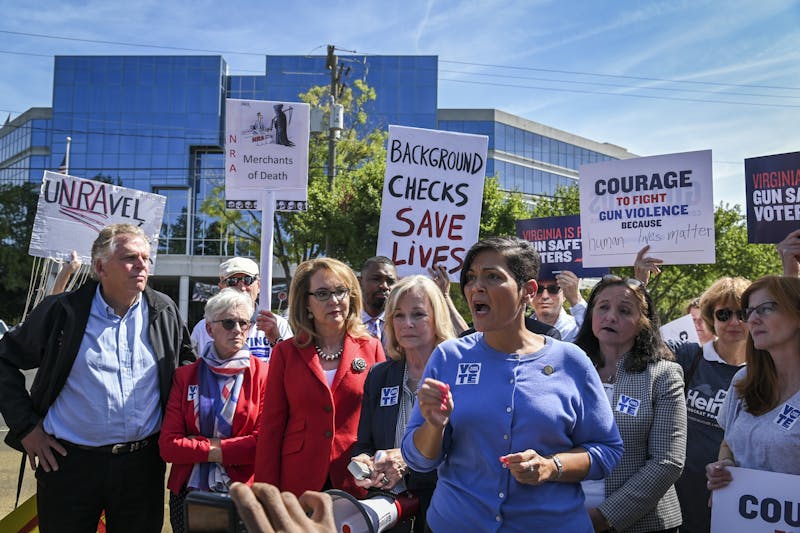
Although it has moved from a purple to a blue state over the last decade—Republicans haven’t won a statewide race since 2009—Virginia still looks a lot like the United States as a whole. Democrats dominate urban areas and Republicans rural ones, with the suburbs largely serving as battlegrounds.
The growing divide between city and the country accelerated after the election of Barack Obama in 2008, a trend that gained additional momentum with Trump’s election in 2016. The big post-Obama backlash on the right pushed elected Democrats out of rural areas, especially in mountainous southwest Virginia. And in 2017, a fierce anti-Trump backlash did the same in the opposite direction, ejecting Republican lawmakers from wealthy Northern Virginia and suburban districts populated by more highly educated voters.
“The shift from a bipartisan to a unipartisan rural America is a big shift,” Ryer, the Republican press secretary, said. “The shift from Republican-leaning to a Democrat-leaning suburban America is a big shift.”
Ryer added, “I’ve been telling our members this for some time: If you’re spending a disproportionate amount of time with people who are drinking wine, you’re in the wrong place. It’s nice to compete there, and we need to get our share there, but that isn’t our growth area.”
But as a result, the Republican path to victory in Virginia is tricky, especially since the GOP is already playing defense in a chaotic environment presided over by the president. For one, Republican candidates, unlike their energized Democratic counterparts, are sticking to a few hoary talking points—mostly revolving around taxes, abortion, and fears that a Democratic majority would be bad for business—a testament to how little Trump has given them to cheer about, despite a solid economy.
The GOP-controlled General Assembly issued one-time tax refunds of $110 to Virginians that are now arriving in mailboxes. And social conservatives are particularly incensed about a viral video in which Northam, responding to a question about a bill that would loosen restrictions on third-trimester abortions, said that in cases with a non-viable fetus, “The infant would be delivered, the infant would be kept comfortable, the infant would be resuscitated if that’s what the mother and the family desired, and then a discussion would ensue between the physicians and the mother.” That confusing phrasing led his critics, including President Trump, to cite it as evidence that Northam supports infanticide. Shipley, the Republican spokesman, said it polls off the charts: “Anytime this basic video is shown to people, it’s a stop-you-in-your-tracks moment. Even pro-choice Democrats say, ‘That’s wrong’ when they see that video. Anytime a Democrat starts to argue with us about abortion, that’s our entire response.”
Republicans are also competing in fewer districts, writing off certain urban and suburban areas as lost causes. Democrats fielded 92 candidates for 100 House seats, and 36 for 40 Senate seats, while Republicans are running 71 and 25 House and Senate candidates, respectively. Democrats racked up many of their 2017 wins in Northern Virginia, and now seek to hold those newly won districts while flushing the remaining Republicans out of Loudon, Prince William, and Stafford counties—localities that have been absorbed, culturally and politically, into exurban Washington, D.C.
Republicans have been hit hard by redistricting, too. The Hampton Roads region on the coast features three vulnerable freshmen Democrats facing challenging re-election bids, along with several other races where Democrats are angling for pick-ups. Republican efforts to defend key House seats there were complicated by a January decision in which federal judges adjusted the boundaries of 26 districts to remedy racial gerrymandering. Eleven-term Republican Delegate Chris Jones, who chairs the House budget committee and largely drew the districts that were thrown out, saw his Suffolk-based district go from being 68 percent white and 26 percent black to 50 percent white and 45 percent black after the court’s adjustments; it once favored Republicans by 12 points, and now favors Democrats by 15, according to the Virginia Public Access Project.
The redrawn House districts include those in the much-contested Richmond suburbs. This is where House Speaker Kirk Cox faces an unexpectedly difficult re-election campaign in a district that went from a 26-point Republican advantage to a 6-point Democratic edge.
National Democratic leaders often frame opposition to Trump as an either/or proposition: Either Democrats target Trump directly (through, say, impeachment, often depicted as the inferior course) or focus on the granular issues “voters care about” (stagnant wages, prescription drug prices, etc.). But what the off-year races in Virginia show is that raging opposition to Trump is a gateway to all kinds of issues that voters do care about and that Republicans have steadfastly ignored in their campaign to boil everything down to grievance-driven backlash politics. And the focus on such issues cannot help but highlight a whole method of Republican governance that voters have grown tired of.
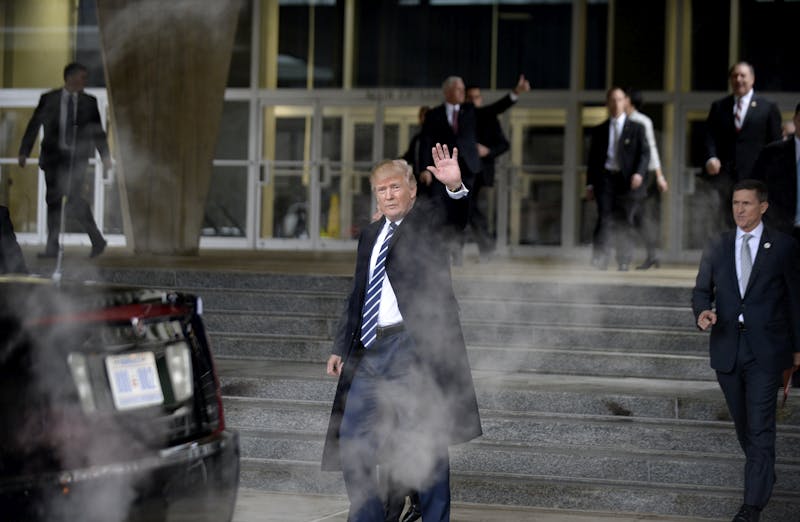
Hurst, the freshman Democrat in Appalachian Virginia, said he believes that trust and integrity matter more than ever to voters, at a time when many of them feel increasingly cynical about politics. “A lot of people have asked me, ‘What’s the message, what’s the issue?’” Hurst said. “I don’t know a lot of people will be motivated on one issue, but a lot of people will be willing to vote for a Democrat or Republican of the other party if they feel that person represents them. You’re never going to get someone who disagrees on abortion and gun rights to agree with you. I have a lot of people who disagree with me on strident social issues but vote for me because they trust me.”
“The failure on the part of Republican leadership, whether at the state or national level, is resonating very strongly with so many voters still,” said Hashmi, the Senate challenger being targeted with Northam’s blackface scandal. “We need to make sure Virginia leads the way in effectively responding to the tone and climate that Donald Trump has created.”
The biggest question surrounding these elections will be whether Democrats turn out without a statewide election atop the ballot. The turnout drop in past off-year elections enabled Republicans to overachieve and maintain their legislative majorities even as Virginia trended more Democratic as a whole. “In 2019, there’s really only one question,” said Greg Habeeb, a Republican who served nearly eight years in the House of Delegates before resigning last year. “It’s, does turnout revert back to the historic norm in Virginia, or do we have 2017-ish turnout again?”
Even if turnout lags and Republicans manage to hold a majority in one or both chambers, Habeeb says the impact of Trump’s presidency will linger long past his stint in the White House. He cites his daughter’s elementary school in suburban Richmond, in an area once considered to be upper-class white, but now is majority-minority.
“It’s almost all first-generation Americans,” Habeeb said. “A lot of these new voters don’t come with a pre-established partisan identity. They respect hard work and accomplishment, and look for people focused on business and family issues. They’re very much swing voters. The problem for Republicans is that if you cause those first-generation voters to build a habit of voting for one side or the other, you eventually create a partisan identity.”
For Republicans in Virginia—as well as in the rest of the America—that may ultimately be Trump’s most devastating legacy.
